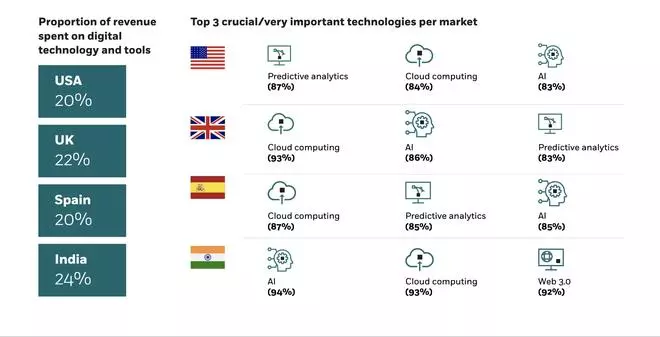India shows ‘remarkable progress’ in digital transformation with an aggressive drive supported by substantial investments, says a global survey 2024AI in the Enterprise, commissioned by leading digital transformation solutions provider UST. It reached out to 600 senior decision-makers in large companies with a combined revenue of $10 trillion+ in the US, UK, and Spain.
The rapid digitalisation could be driven by several factors, including government initiatives promoting digital infrastructure, a burgeoning tech-savvy population, and the growing presence of IT and technology sectors. At the same time, the fear of automation impacting jobs reflects a rapidly evolving workforce that needs to adapt to new technologies, the survey pointed out.

Snapshot of 2024 AI in the Enterprise survey commissioned by digital transformation solutions provider UST | Photo Credit: UST
Significant barriers
At least 33 per cent of respondents ranked this as one of the significant barriers to AI implementation, indicating a need for careful management of workforce transition and upskilling. An emerging regulatory concern with respect to the need for improving data quality and services signals data management and governance challenges. Addressing these concerns could further boost India’s position as a leader in digital transformation, the survey said.
Allocation of a substantial portion of revenue by large companies, higher than in other markets, reflects the priority placed on technology and digital tools in driving business operations and strategy. There is a considerable demand for external expertise in AI implementation, with at least 32 per cent of respondents highlighting the need for ‘more suitable options.’
Lack of skilled talent
Without a skilled talent pool, organisations risk increased reliance on external providers, limiting agility. The severe shortage of talent demands that organisations invest in upskilling their workforce and building partnerships with educational institutions. The survey highlighted the need for holistic strategies aligned with long-term business goals while integrating AI into core business processes. This should not be an isolated initiative but an essential part of the broader corporate strategic framework.
Strong policy framework
The survey also called for comprehensive policies addressing data privacy, algorithmic bias, and regulatory compliance. Solid governance not only mitigates risks but also builds trust among stakeholders. Constant learning and adaptation need to be prioritised for promoting AI literacy and an open mindset for ongoing education and innovation. On diversity and inclusion, the survey noted that diverse perspectives mitigate biases and foster innovation. Inclusive hiring practices and designing AI systems with diverse data sets are vital. Sufficient resources must be set apart for AI projects and metrics to track return on investment.




Comments
Comments have to be in English, and in full sentences. They cannot be abusive or personal. Please abide by our community guidelines for posting your comments.
We have migrated to a new commenting platform. If you are already a registered user of TheHindu Businessline and logged in, you may continue to engage with our articles. If you do not have an account please register and login to post comments. Users can access their older comments by logging into their accounts on Vuukle.